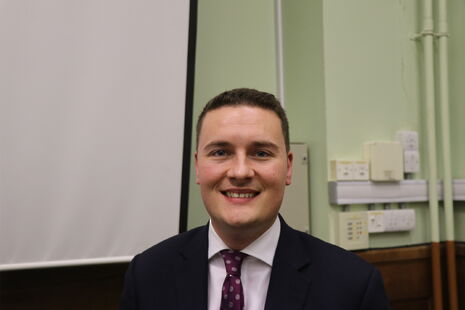Wes Streeting: It is ‘soul-destroying’ that many working-class students don’t apply to Oxbridge
Raphael Korber Hoffman speaks to Wes Streeting MP about the NUS, Oxbridge access, and his thoughts on Brexit and the Labour party

As a former National Union of Students president who focused on “financial sustainability” and a reorientation of the NUS’s political outlook so that it “was more student-centred and focused on student issues”, Wes Streeting, speaking to me before an event at Pembroke Politics, says that he is “gutted” to see the NUS in its current state.
Faced with the disaffiliation of some university students’ unions and financial difficulties, the NUS has recently courted a range of controversies. When we spoke, Streeting emphasised his approval of current president Shakira Martin’s recognition of “a lot of the problems within the NUS” and applauds the way that she has tried to “refocus it back on the student’s interests”.
“Without an NUS there are no liberation campaigns anyway”
He goes on to argue that it is important for Student Unions to support the NUS as it attempts to deal with its current and well-documented financial problems. In reference to the NUS’s decision to defund its trans campaign, for instance, he acknowledges that “with financial challenges there are bound to be some controversial decisions”. However, he also states that “without an NUS there are no liberation campaigns anyway.” He hopes that the NUS will be able to support “trans self-organization and voices”, regardless of their abandonment of the trans campaign in the near future.
I ask Streeting, a Cambridge alumnus, what his thoughts are on the statement made by his Labour Party colleague David Lammy regarding the elitism of Oxbridge admissions. Streeting agrees with Lammy, and adds that as a person from a working-class background, he finds it “soul-destroying” that many students from a similar background never even apply to Oxbridge because “they [don’t] think they would fit in.”
Reflecting on his own university experience, Streeting adds that “as someone from a working-class background and family who came here, I had a great time and I think that it’s a much more welcoming and inclusive place than lots of people give it credit for.” But how can we tackle this perception problem? For Streeting, the best approach would be for “those of us who can be ambassadors for the University … to do what we can to dispel the myths that Cambridge is a place where you have to be posh to fit in, because I don’t think that’s true.”
The lack of consensus over how best to solve this access problem manifests in Streeting’s disagreement with the proposal recently put forth by Labour peer Lord Adonis that Oxford and Cambridge should open new colleges for disadvantaged students. Streeting thinks a more appropriate solution would be to focus on options such as foundation degrees. These would function as “kind of early entry points between 16 to 18 for people who may be demonstrating some academic potential but are at risk of not realising it because of their local educational environment or situation at home”. He contends that this is a better alternative to opening what he refers to as essentially “working-class colleges.”
I asked Streeting about his thoughts on a no-deal Brexit — a possibility that threatens to cause damage to higher education in the UK and is causing confusion over the future status of EU students. Streeting hopes that a no-deal Brexit can be averted and that there will still be an opportunity to go back to the voters in a second referendum on a deal reached between the UK and the EU.
“I think voters will always give you a lot of credit for telling the truth”
A self-described “passionate remainer”, Streeting nevertheless voted to trigger Article 50. “My attitude was to take it on the chin and try and make it work … my view was that we had to honour the outcome of the referendum – not least because of issues around crises of trust in politics over the last couple of years. I think we’ve seen so much chaos.” But would a second referendum, as its opponents claim, only further erode this trust in a political class viewed by some as determined to frustrate Brexit at every turn? Not according to Streeting.
He makes the case that “there is a democratic moral duty on us to ask the voters to give their informed consent.
“So, if people now, knowing what Brexit looks like, still vote to go ahead with it, then we take it on the chin and we move forward knowing that we’ve got permission.” Notably, Streeting published an article on the PoliticsHome website just a few days before our interview – in which he said he would rather lose his job than stay silent on Brexit and risk that his constituents lose theirs. I ask if this is a sacrifice he could reasonably expect his Labour colleagues to make too.
“From talking to Leave voters in my constituency who strongly disagree with me on this, the vast majority of them respect the fact that I have a view, that I’m making an argument, and I have to do what I think is right. And so I think voters will always give you a lot of credit for telling the truth.”
Streeting believes the causes for the Brexit vote “lie in parts of the country that feel completely left behind where their industries have been hollowed out, where their jobs, conditions, housing, infrastructure are left behind.
“All of those problems are made in Britain, not in Brussels. And solving all of those problems is something we can only do in Britain. And that job is made harder if we’re outside of the European Union and paying a heavy economic price.”
“I think the membership needs to speak now and speak loudly and with one voice”
I asked what his response would be to young, remain-voting Labour supporters — whose numbers are not insignificant in places such as Cambridge — who feel that the Labour party is letting young people down through its ambivalent position on Brexit. He responded that it was important to “lobby [your local MP], to speak to them, to do everything you can to persuade them.” He maintains that “one of the things about Jeremy Corbyn is that he does take the Labour party membership seriously and I think that given that we have such an overwhelmingly pro-European membership, I think the membership needs to speak now and speak loudly and with one voice.”
This appeal to “one voice” seems a somewhat optimistic view of a party split in many different directions over different issues within Labour, from Corbyn’s leadership to the handling of antisemitism. Nonetheless, Streeting believes that Remainers in the Labour party have an advantage in support for the EU within the party’s membership base, “something which unites people right across the Labour Party from some of Jeremy Corbyn’s strongest supporters to some of Jeremy Corbyn’s harshest critics.”
In any case, with an exit from the European Union looming large on the horizon and a Labour leadership seen as indecisive over the Brexit issue, Remainers in the Labour party may start to see fewer and fewer reasons for optimism.
 Comment / Plastic pubs: the problem with Cambridge alehouses 5 January 2026
Comment / Plastic pubs: the problem with Cambridge alehouses 5 January 2026 News / Cambridge businesses concerned infrastructure delays will hurt growth5 January 2026
News / Cambridge businesses concerned infrastructure delays will hurt growth5 January 2026 News / New movement ‘Cambridge is Chopped’ launched to fight against hate crime7 January 2026
News / New movement ‘Cambridge is Chopped’ launched to fight against hate crime7 January 2026 News / AstraZeneca sues for £32 million over faulty construction at Cambridge Campus31 December 2025
News / AstraZeneca sues for £32 million over faulty construction at Cambridge Campus31 December 2025 Interviews / You don’t need to peak at Cambridge, says Robin Harding31 December 2025
Interviews / You don’t need to peak at Cambridge, says Robin Harding31 December 2025










